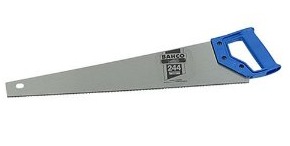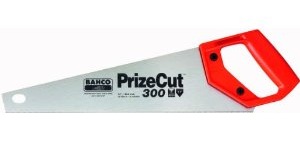Buying a handsaw
Buying a handsaw for your DIY needs sounds simple, but the enormous array of options on the market, can make the whole process pretty confusing. Defining a handsaw in itself can be complicated as you could include any hand held saw in this category, but for the purpose of this guide I’m talking about the basic, general purpose saw, normally called a panel saw, with the easily recognisable shape shown below. In all my working life, I would estimate that this type of handsaw has dealt with 90% of my sawing needs, on those occasions where I can’t use a power saw of some nature. Now, if you’re a cabinet maker, furniture maker, or do a lot of fine woodworking joints, you will need a larger selection of saws, so in this guide I really am just talking about your simple ‘go-to’ saw for general DIY needs.

Bahco handsaws are completely unremarkable to look at, but wait till you use them!
Having used most models on the market, there is one saw that sits firmly in top place on my list of handsaws. Pictured right, the Bahco 20″ 244 handsaw is, for me, the best option on the market. Irwin also make good handsaws in this class, but I consistently find that the Bahcos are cheaper, and marginally out perform the Irwins. The Bahco pictured right available on Amazon, would therefore always be my choice, a decision that I will explain further, in the rest of this post.
Ripsaws or cross-cut saws or universal
Although you can still get these saws, they really are old technology (traditional woodworkers – please don’t scream at me). Ripsaws were a design used for cutting with the grain, and cross-cut were for across the grain. Basically the modern handsaw design does both jobs in one. Therefore, the language you look for now with a saw description are terms like “universal” which means they have the capability to cut effectively both with, and across the grain.
Saw teeth
All saws have a measurement of the frequency of teeth along the blade. This is measured in points per inch (PPI) or teeth per inch (TPI). Therefore the larger the figure, the finer the cut. So, why not always go for high PPI? Well, although the higher PPI produces the finest cut, it also takes much longer to do (and more effort!), so for general purpose sawing, you tend to go for a lower PPI as it’s much quicker (less effort!), and you still get a sufficient degree of accuracy. A good medium, general purpose TPI is 7. Also, a saw’s effectiveness has much to do with the precise design of the teeth, and the actual steel used for the teeth construction. You will see many patented designs regarding how teeth stay sharper longer etc.
Blade lengths

Bahco toolbox saw – does the job, and easy to store!
The longer the blade, the longer the cutting stroke, and therefore the less strokes required to cut, therefore the less effort and easier cut. Typically handsaws range between 20 inch and 22 inch – wow, big difference, but I find you get greater control with the 20 inch blade. One brilliant option in this area is what are now called toolbox saws. These are the same design as a standard handsaw but have shorter blades so they fit in your toolbox. Brilliant idea in my opinion, and what I tend to do is have one with a slightly larger TPI than my full size handsaw, so if I do need a finer cut than normal – it’s perfect for the job. Therefore if you want a great general purpose saw that fits out the way in your toolbox, the little Bahco model pictured right would be my choice – again available on Amazon.
Making the choice
As detailed at the top of this guide, for me, the Bahcos are the best. No saw lasts forever, so what I tend to do is when I buy a new one, the old one gets used for sawing plasterboard, insulation, and all those other materials that you really shouldn’t be using a new saw to cut! In this way, your new saw becomes your wood, and wood alone saw, with your old saw still prolonging its life with cutting ‘other’ materials. Having initially thought toolbox saws were a bit of a gimmick, I’m now totally converted as they can still do the job of their bigger counterparts, whilst being so easy to store out the way. The links I’ve provided above take you to the Bahco saws on Amazon. It is also worth checking the Screwfix prices as I sometimes see the Bahco 244’s for under £8 each, which just seems unbelievable value for money to me.
